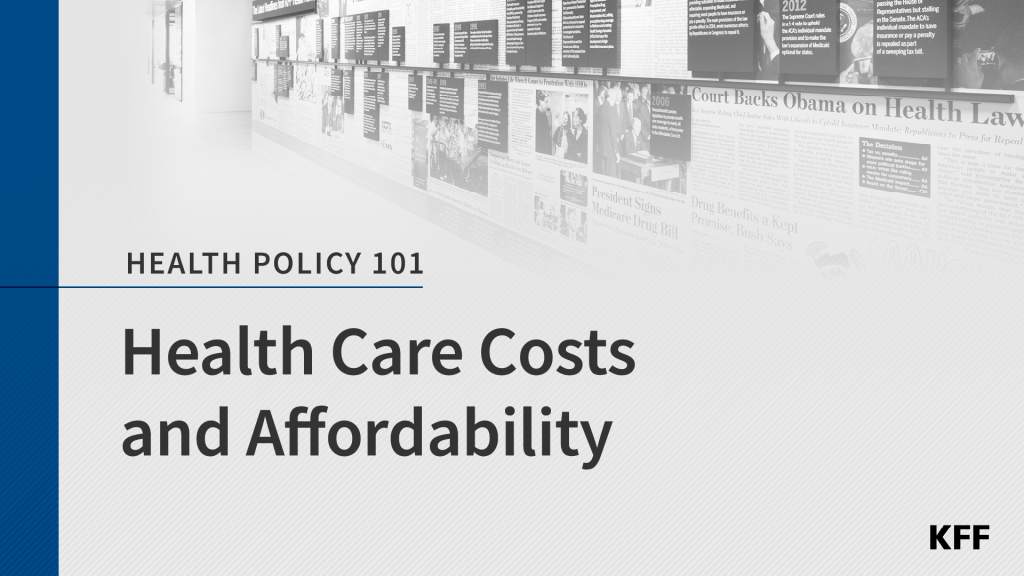It’s Not Just the Uninsured — It’s Also the Cost of Health Care
The number of uninsured is down. Health spending has moderated. But health is on the public’s mind. Drew Altman helps explain why in this Axios column.
The independent source for health policy research, polling, and news.
KFF’s policy research provides facts and analysis on a wide range of policy issues and public programs.
KFF designs, conducts and analyzes original public opinion and survey research on Americans’ attitudes, knowledge, and experiences with the health care system to help amplify the public’s voice in major national debates.
KFF Health News is a national newsroom that produces in-depth journalism about health issues and is one of the organization’s core operating programs.
Health Policy 101 is a comprehensive guide covering fundamental aspects of U.S. health policy and programs, including Medicare, Medicaid, the Affordable Care Act, employer-sponsored insurance, the uninsured population, health care costs and affordability, women's health issues, and health care politics. The Health Care Costs and Affordability chapter explores trends in health care costs in the U.S. and the factors that contribute to this spending. It also examines how health care spending varies across the population, the impact of costs on care affordability and individuals' overall financial vulnerability.
The number of uninsured is down. Health spending has moderated. But health is on the public’s mind. Drew Altman helps explain why in this Axios column.
A new Kaiser Family Foundation brief examines out-of-network claims in large employer plans, and finds that a significant share of inpatient hospital admissions includes bills from out-of-network providers, often leaving patients exposed to "surprise medical bills" and high out-of-pocket costs.
A new Kaiser Family Foundation analysis of medical bills from large employer plans finds that a significant share of inpatient hospital admissions includes bills from providers not in the health plan’s networks, generally leaving patients subject to higher cost-sharing and potential additional bills from providers.
This slideshow draws on findings from the June 2018 Kaiser Family Foundation poll to provide an overview of the public’s experiences with medical bills, particularly for 18-64 year olds. Results include public’s problems with paying medical bills, impacts on their family, as well as actions taken to pay off bills.
Using data from the Kaiser Family Foundation/Episcopal Health Foundation 2018 Texas Health Policy Survey, this brief explores Texas residents’ experiences with health care affordability and access to care. It examines Texans’ difficulty affording health care compared to other basic needs, problems paying medical bills, and skipping or postponing care because of costs. It also explores the experiences of vulnerable groups like the uninsured and those with lower incomes.
Affording health care ranks at the top of Texans’ financial concerns, with more than half (55%) saying it is difficult for them and their families to afford health care, including a quarter (25%) who say it is “very difficult,” finds a new Kaiser Family Foundation/Episcopal Health Foundation poll of Texas residents.
More than four years after the implementation of the Medicaid expansion included in the Affordable Care Act, debate and controversy around the implications of the expansion continue. Despite a large body of research that shows that the Medicaid expansion results in gains in coverage, improvements in access and financial security, and economic benefits for states and providers, some argue that the Medicaid expansion has broadened the program beyond its original intent diverting spending from the “truly needy”, offers poor quality and limited access to providers, and has increased state costs. New proposals allow states to implement policies never approved before including conditioning Medicaid eligibility on work or community engagement. New complex requirements run counter to the post-ACA movement of Medicaid integration with other health programs and streamlined enrollment processes. This brief examines evidence of the effects of the Medicaid expansion and some changes being implemented through waivers. Many of the findings on the effects of expansion cited in this brief are drawn from the 202 studies included in our comprehensive literature review that includes additional citations on coverage, access, and economic effects of the Medicaid expansion.
States that have expanded Medicaid under the Affordable Care Act generally have seen gains in coverage, improvements in access to and affordability of health care, and net fiscal benefits, a growing body of research and data show.
Very Few Say They Would Want to Purchase a Short-Term Plan, A Regulation Being Drafted By The Trump Administration Nine in 10 enrollees in the non-group market say they intend to continue buying their own insurance even after being told that Congress has repealed the individual mandate penalty for not having coverage as of 2019,…
This report explores the experiences of individuals who purchase their own insurance through the Affordable Care Act (ACA) marketplace. The poll finds marketplace enrollees are worried about the future of health insurance availability and costs in their areas, but most say their premiums have not increased this year and they are satisfied with their insurance options.
© 2026 KFF
